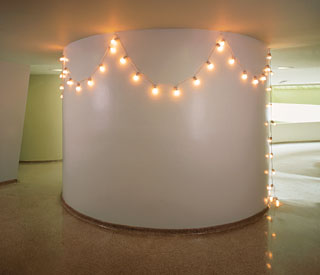|
| |
 |
|



|

"Untitled" (America #1), 1992. Fifteen-watt lightbulbs, porcelain light sockets, extension cord, overall dimensions vary with installation, 42 feet length, with 20 feet extra cord. The Carol and Arthur Goldberg Collection.
|

Felix Gonzalez-Torres's stacks of imprinted paper, electric light strings, and candy spills—which he arranged in corners and across floors—are subversive rearticulations of Minimalism's nonrepresentational aesthetic. While recalling Carl Andre's metal carpets and Donald Judd's sequenced boxes, they undermine the supposed neutrality of such work. Gonzalez-Torres reintroduced what had been sublimated in much Modernist art—desire, loss, vulnerability, and anger—with a potent but quiet poignancy through texts inscribed on giveaway paper sheets and subtitles appended to "untitled" works. Free for the taking and replaceable, his perpetually shrinking and swelling sculptures defy the macho solidity of Minimalist form, while playfully expanding upon the seriality of the genre and the quotidian nature of its materials.
Gonzalez-Torres's early text pieces are lists of seemingly random historical incidents followed by the dates of their occurrence. Drawing on the language-based art of the early Conceptualists, he created blank, television-like screens imprinted with captions detailing our culture's fascination with violence, materialism, and desire.
"Untitled" (Public Opinion) is a dark, aggressive sculpture. The missilelike shape of the candy and its brooding, almost sinister, appearance allude to our culture's pervasive militaristic outlook and hostile hegemonic stance. As an artwork produced in the conservative political climate of the first Bush administration and the Persian Gulf War, the work presages the still pervasive censorship in America and suggests that public opinion is not as informed as it once was.
A self-acknowledged gay man who suffered the death of his longtime companion, Gonzalez-Torres expressed his grief and love for this man—as well as his outrage at a social system that marginalizes "others" such as homosexuals, the economically disenfranchised, and foreigners—in much of his work. "Untitled" (Passport), a stack of blank white paper, suggests a world without arbitrary borders and assigned nationalities, offering dreams of unfettered space and boundless travel.
|
|